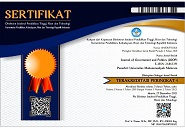The Impact of Defense Policy on Quality of Life, Poverty, and Inequality
Abstract
Defense policies, traditionally focused on national security, have extensive implications for a country's socio-economic structure, influencing quality of life, poverty, and inequality. This research aims to explore the complex relationship between defense spending and these socio-economic outcomes across different contexts. Using a qualitative approach, the study utilizes secondary data from academic journals, government reports, and policy documents to analyze how defense policies impact various socio-economic groups. The findings reveal that in wealthier nations, defense spending can stimulate economic growth but often exacerbates social inequality due to the unequal distribution of benefits. In contrast, in less wealthy nations, high military expenditure typically comes at the expense of essential public services, leading to increased poverty and poorer health outcomes. The study also highlights the critical role of governance in mediating these effects, with strong institutions ensuring more equitable outcomes. In conclusion, defense policies have a profound impact on socio-economic conditions, and a context-specific approach is essential to ensure that national security investments do not undermine social welfare.
Keywords: defense policy, inequality, poverty, quality of life, socio-economic impact
Keywords
Full Text:
PDFReferences
Adam, S. (2016). The wealth of nations. Aegitas.
Austin, K. F., & McKinney, L. A. (2016). Disaster devastation in poor nations: the direct and indirect effects of gender equality, ecological losses, and development. Social Forces, 95(1), 355–380.
Biscione, A., & Caruso, R. (2021). Military expenditures and income inequality evidence from a panel of transition countries (1990-2015). Defence and Peace Economics, 32(1), 46–67.
Campbell, K. M., Gulledge, J., McNeill, J. R., Podesta, J., Ogden, P., Fuerth, L., Woolsey, R. J., Lennon, A. T. J., Smith, J., & Weitz, R. (2022). Age of consequences: the foreign policy and national security implications of global climate change. Center for a New American Security.
Collier, P., & Hoeffler, A. (2016). Military Spending and the Risks of Coup d’État. Journal of Conflict Resolution, 56(4), 595–616.
Creswell, J. W. (2018). Qualitative Inquiry and Research Design: Choosing Among Five Approaches* (4th ed.). SAGE Publications.
d’Agostino, G., Dunne, J. P., & Pieroni, L. (2016). Government spending, corruption and economic growth. World Development, 84, 190–205.
Dunne, J. P., & Tian, N. (2017). Military expenditure, economic growth and heterogeneity. In Defense Spending, Natural Resources, and Conflict (pp. 25–42). Routledge.
Elinder, M., Erixson, O., & Waldenström, D. (2018). Inheritance and wealth inequality: Evidence from population registers. Journal of Public Economics, 165, 17–30.
Galeotti, M. (2022). The weaponisation of everything: A field guide to the new way of war. Yale University Press.
Haile, F., & Niño‐Zarazúa, M. (2018). Does social spending improve welfare in low‐income and middle‐income countries? Journal of International Development, 30(3), 367–398.
Heo, U., & Bohara, A. K. (2017). The Political Economy of Military Spending in the United States. Political Research Quarterly, 64(3), 555–567.
Kaldor, M. (2013). New and old wars: Organised violence in a global era. John Wiley & Sons.
Karampekios, N., Oikonomou, I., & Carayannis, E. G. (2017). The Emergence of EU Defense Research Policy. Cham: Springer.
Kentor, J., & Jorgenson, A. (2017). Military expenditures and health: a cross-national study, 1975-2000. International Journal of Sociology and Social Policy, 37(13/14), 755–772.
McDade, T. W., Georgiev, A. V, & Kuzawa, C. W. (2016). Trade-offs between acquired and innate immune defenses in humans. Evolution, Medicine, and Public Health, 2016(1), 1–16.
Menshikov, V., Volkova, O., Stukalo, N., & Simakhova, A. (2017). Social economy as a tool to ensure national security. Journal of Security & Sustainability Issues, 7(2).
Moretti, E., Steinwender, C., & Van Reenen, J. (2023). The intellectual spoils of war? Defense R&D, productivity, and international spillovers. Review of Economics and Statistics, 1–46.
Morillo, S. (2017). What is military history? John Wiley & Sons.
Pozen, D. E. (2018). Transparency’s ideological drift. Yale LJ, 128, 100.
Rahman, T., & Siddiqui, D. A. (2019). The effect of military spending on economic growth in the presence of arms trade: a global analysis. Available at SSRN 3401331.
Reiter, D. (2017). The Sword’s Other Edge: Trade-offs in the Pursuit of Military Effectiveness. Cambridge University Press.
Saba, C. S., & Ngepah, N. (2019). A cross-regional analysis of military expenditure, state fragility and economic growth in Africa. Quality & Quantity, 53(6), 2885–2915.
Sen, A. (2014). Development as freedom (1999). The Globalization and Development Reader: Perspectives on Development and Global Change, 525.
Slawotsky, J. (2021). The fusion of ideology, technology and economic power: Implications of the emerging new United States national security conceptualization. Chinese Journal of International Law, 20(1), 3–62.
Smart, B. (2016). Military-industrial complexities, university research and neoliberal economy. Journal of Sociology, 52(3), 455–481.
Stiglitz, J. E. (2019). People, power, and profits: Progressive capitalism for an age of discontent. Penguin UK.
Sutyagin, I. (2022). Russian forces in Ukraine. Royal United Services Institute (RUSI).
Töngür, Ü., & Elveren, A. Y. (2016). The impact of military spending and income inequality on economic growth in Turkey. Defence and Peace Economics, 27(3), 433–452.
Wilkinson, R., & Pickett, K. (2019). The inner level: How more equal societies reduce stress, restore sanity and improve everyone’s well-being. Penguin.
Yin, R. K. (2009). Case study research: Design and methods (Vol. 5). sage.
Zhang, Y., Liu, X., Xu, J., & Wang, R. (2017). Does military spending promote social welfare? A comparative analysis of the BRICS and G7 countries. Defence and Peace Economics, 28(6), 686–702.
DOI: https://doi.org/10.31764/jgop.v6i2.26655
Copyright (c) 2024 Aris Sarjito
This publication is indexed by:





.png)










1.JPG)